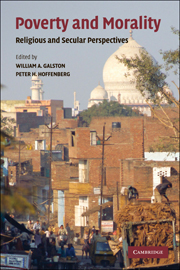Book contents
- Frontmatter
- Contents
- Contributors
- Acknowledgments
- 1 Introduction
- 2 Global Poverty and Unequal Development
- 3 The Karma of Poverty
- 4 Poverty and Morality in Christianity
- 5 Classical Liberalism, Poverty, and Morality
- 6 Confucian Perspectives on Poverty and Morality
- 7 Poverty and Morality
- 8 Hinduism and Poverty
- 9 The Problem of Poverty in Islamic Ethics
- 10 Jewish Perspectives on Poverty
- 11 Liberal Egalitarianism and Poverty
- 12 Marxism and Poverty
- 13 Poverty and Natural Law
- 14 Afterword
- Select Bibliography
- Index
- References
13 - Poverty and Natural Law
Published online by Cambridge University Press: 05 June 2012
- Frontmatter
- Contents
- Contributors
- Acknowledgments
- 1 Introduction
- 2 Global Poverty and Unequal Development
- 3 The Karma of Poverty
- 4 Poverty and Morality in Christianity
- 5 Classical Liberalism, Poverty, and Morality
- 6 Confucian Perspectives on Poverty and Morality
- 7 Poverty and Morality
- 8 Hinduism and Poverty
- 9 The Problem of Poverty in Islamic Ethics
- 10 Jewish Perspectives on Poverty
- 11 Liberal Egalitarianism and Poverty
- 12 Marxism and Poverty
- 13 Poverty and Natural Law
- 14 Afterword
- Select Bibliography
- Index
- References
Summary
Natural law ethics as developed by Thomas Aquinas (1225–74 ce) and his heirs constitutes a vital intellectual tradition. The interpretation of this ethic has gone through many stages and variations over the course of the past eight hundred years. Just as the nature of poverty changed significantly from the medieval to the modern and contemporary periods, so also has natural law reflection on poverty. This chapter begins with an exposition of the basic lines of Thomas Aquinas’s natural law ethic, particularly as it was applied to poverty; provides a brief explication of one of this tradition’s most important early modern advocates, Bartolomé de Las Casas, O.P., the sixteenth-century “Defender of the Indians”; and examines the work of John Finnis, one of the founders of the “new natural law theory,” and the use of his theory by a development economist, Sabina Alkire. Finally, these three descriptive sections are followed by an account of the relevance of natural law ethics for the issue of poverty today.
It should be understood that a single chapter can only briefly treat authors who deserve much more extensive examination than is possible here. This chapter attempts to show that the natural law tradition provides significant grounds for promoting justice for the poor as a matter of human rights and the common good, and that justice at its core aims at empowering the poor to act as agents of their own lives.
Keywords
- Type
- Chapter
- Information
- Poverty and MoralityReligious and Secular Perspectives, pp. 265 - 284Publisher: Cambridge University PressPrint publication year: 2010



